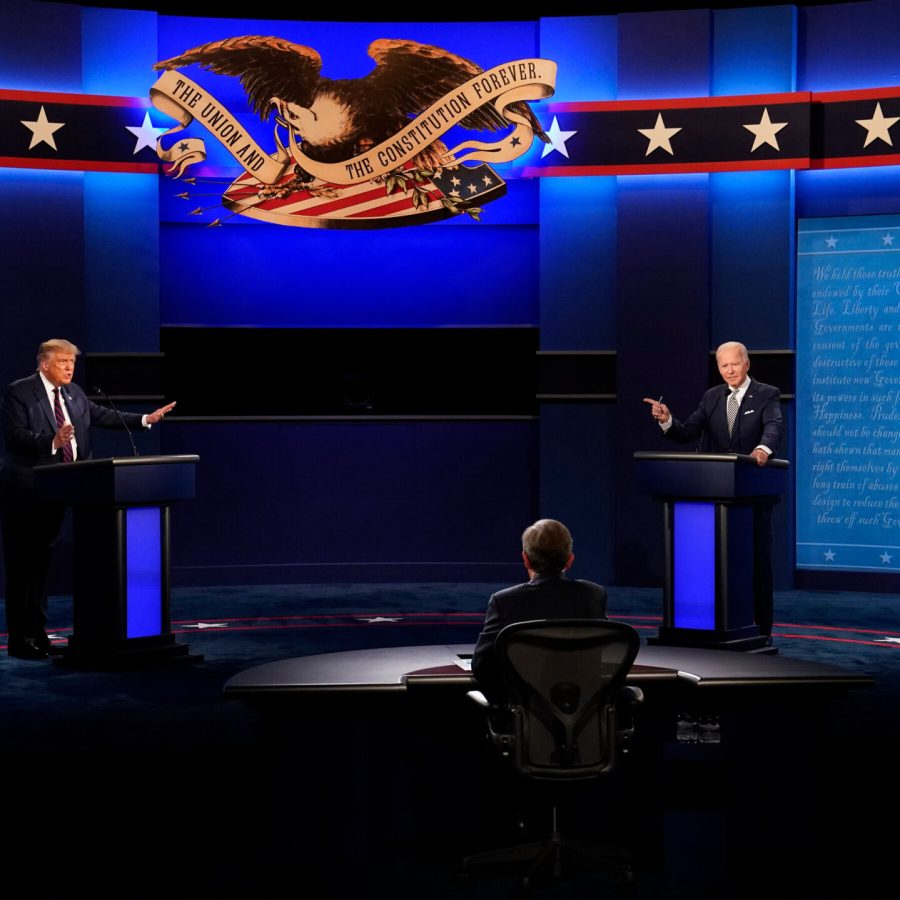The Debate Heard Round the World
Courtesy of Doug Mills, The New York Times
The Debate Heard Round the World
October 7, 2020
I’ve never really been invested in politics and always tended to shy away from political discussions, as these conversations could easily spark into fierce, unfriendly discourse. However, regardless of which political party you may support, it is undeniable that the traction for the first 2020 presidential debate reached heights that will likely solidify its place as one of the most popular debates in history. I know many people who were eager to watch this highly anticipated event, some of whom do not care about politics at all. Even on campus, Tuesday night was made into an event with many people, including myself, gathering in small groups to watch President Donald Trump and former Vice President Joe Biden meet face-to-face for the first time since Trump’s inauguration. While it was a chaotic debate to be sure, it is one that will remain in viewers’ minds for many years to come. But why is that exactly, and what does this mean for the future of customary presidential debates moving forward?
The primary purpose of the debates is for each candidate to make their case as to why he or she is fit to be president and to sway voters before the election, especially those who are undecided. As a relatively undecided and new voter myself, this debate was primarily targeted at me and the growing number of undecided voters since the 2016 election However, this year there is way more to it than that.
In the midst of a global pandemic, many wanted to hear each candidate’s plan for halting the spread of COVID-19 across the country to determine whether the current president’s plan could still prove effective or if change is needed in the form of a new leader. People wanted concrete answers and in reality, this segment of the debate was where we received the most information, with Trump advocating for reopening the country, while Biden took a more cautious approach to the matter.
Anticipation for this heated debate was built up through social media. President Trump hasn’t been shy of using his Twitter frequently. Since the start of summer, he has constantly attacked Biden with names such as “Sleepy Joe” and has made numerous tweets calling Biden a coward and not metally fit to run the country. With the President’s strategy of constantly being on the attack, coupled with initial concerns that Biden may not participate in the debates at all, many were eager to see Biden rise up to challenge Trump on the big stage. This is indeed what happened, as the spectacle garnered about 73.1 million viewers, according to an NBC article by Jason Abbruzzese and Dylan Byers. While this statistic is about 13% less than that of Trump v. Clinton debates, this does not take into account the viewers who streamed the debates online. With the increase in popularity of streaming since 2016, it’s fair to say that a decent amount of viewers watched online.
However, the significant uptick in interest lies in arguably one main reason: the entertainment factor. In the past, politics was generally seen as mundane by many (particularly young people) including myself, and it has evolved with the times to fit the current cultural climate. It is noticeably harder to keep the attention and interest of people in today’s modern world of 20-second dancing videos on TikTok and short highlight reels on YouTube, but one person has managed to accomplish this difficult feat. Regardless of your opinions of him, it is undeniable that Donald Trump has brought the entertainment aspect to politics since the start of his campaign run in 2016. An unconventional candidate to say the least, he embodied the persona of the everyday American. His minimal political knowledge prior to his presidential campaign made many feel more invited, comfortable and attentive to politics. In an interview from October 2019 at FreedomFest with interviewer Nick Gillespie, Shark Tank star Kevin O’Leary sums up why Trump won in 2016: “Great politicians, great leaders, great CEOs are phenomenal entertainers… Donald Trump is exactly that. He is a great entertainer.” Gillespie goes on to say that Hillary Clinton’s mistake was not recognizing that the times were changing and that being entertaining was key, even going on to say that her best coverage was the debates with Trump. I find this true in the case of Biden as well.
What does this mean for the future of the debates? I believe this year will mark the peak in terms of viewership and attention to the presidential debates. One of Trump’s recent tweets holds significant merit and foreshadows the future of not only the debates, but politics in general.
“Someday these Fake Media Companies are going to miss me, very badly!!!” he said in reference to the record-breaking cable TV ratings of the first debate.
The country is very different than it was back in 2012, as it is now one that values entertainment. While there are positive consequences of this for American politics as more people are paying attention and getting involved in governmental affairs, there are also negative aspects of it, such as delegitimizing the field by treating politics like a reality show similar to that of “The Apprentice.” Whether this is a good or bad thing for politics is uncertain, but it is evident that this is the current landscape in the U.S. and is one that may shape the form of these debates to meet with the changing times.










